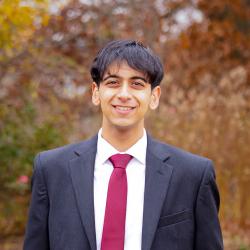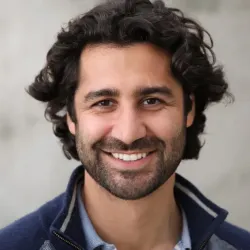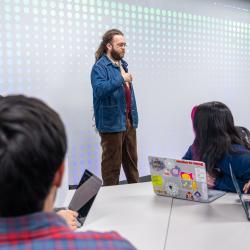Adventures in AI
Adam Wenchel (B.S. ’99, computer science), co founder and CEO of the tech startup Arthur, will share his AI success story as keynote speaker at the 2025 CMNS Undergraduate Commencement Ceremony.
Adam Wenchel (B.S. ’99, computer science) is a computer scientist with the heart of an entrepreneur.

“I love building things, I’m very motivated by that—I want to build things that I'm proud of,” Wenchel explained. “For me, what's fulfilling is building a startup that's valuable to people and does something good for society as well.”
Today, that startup is Arthur, the artificial intelligence (AI) performance company Wenchel launched in 2019. The company’s platform features next-generation products designed to simplify deployment, monitoring and management of AI models to help businesses and others use AI efficiently and safely.
“What we focus on is, if you're putting AI systems out in the world, how do you monitor them to make sure they're saying the right thing and making good decisions, and if they're not, we provide insight into why that is,” said Wenchel, who has been developing AI solutions for more than two decades. “We want to make sure they're delivering great service to whoever their end users are.”
AI, Anax and Arthur
For Wenchel, Arthur is the latest stop on a game-changing, 25-year AI adventure. In the late 90s, Wenchel was doing AI research at the Defense Advanced Research Projects Agency (DARPA) when he was still an undergrad at the University of Maryland, then went on to work with numerous tech ventures. Next came the launch of his first startup Anax Security, followed by an AI leadership role at Capital One, and now Arthur, where Wenchel has continued to make his mark as an AI innovator, pushing the boundaries of technology every step of the way.
“Back when I was an undergrad, I didn't really have this idea that I was going to start this company, it was more like, I'm going to do things that I find intellectually interesting that I think are impactful,” he explained. “And it all just worked out. I’ve been a focused entrepreneur for at least the last 15-plus years.”
In late May, Wenchel will bring his AI success story to UMD as the keynote speaker for this year’s College of Computer, Mathematical, and Natural Sciences Undergraduate Commencement Ceremony. For him, it’s yet another unexpected—and welcome—adventure.
“I've certainly given plenty of talks in front of large audiences, but this is my first time giving a commencement speech, and I promise you that if you told the 22-year-old me, ‘You're going to be speaking at this graduation one day,’ I would have said you're crazy,” Wenchel said. “It’s a surprise and definitely an honor.”
From Atari 800 to AI
Even as a kid, Wenchel was always into computers.
“Growing up in the 1980s, there was a lot of hype around how computers were going to revolutionize the world,” Wenchel recalled. “I used to program this Atari 800 computer back in the day, and I was really into games, so that’s kind of where I got started.”
Years later, as a freshman at UMD, Wenchel’s work at the campus radio station sparked a broader interest in the power of technology.
“We had a mighty 10-watt transmitter that would get about a mile radius around campus, and with some help, I was able to set up one of the first streaming radio stations at Maryland,” Wenchel recalled. “Setting up our first server, I found myself staying up till 2 a.m. to work on it because I was just so excited. All of a sudden, we could broadcast all over the world.”
From then on, Wenchel’s experiences in the Department of Computer Science opened a world of possibilities.
“I think one of the things that Maryland does very well is teach computer science at a really fundamental level,” Wenchel explained. “Whatever the new trend is, whether it's the internet or mobile computing or AI, you have the tools to adapt and understand and thrive in whatever the environment requires. There are many great professors, and to this day, I still draw on what I learned from them, and that's been really meaningful.”
As a senior, Wenchel found himself on the cutting edge of AI in an independent study at DARPA.
“One of my professors, James Hendler, became a program manager at DARPA, and I went there to do research with him. The funny thing is that AI right now is the hottest thing in tech, but back then, it wasn't,” Wenchel explained. “If you told me that in 25 years, this would turn out to be the hottest technology in the world, I would have been shocked—I just found it intellectually interesting.”
Hooked on startups
After Wenchel graduated, he continued working at DARPA for two more years. But with the rise of companies like Google and Amazon, the dot-com boom was calling, and in 2000, when he was asked to lead software development for the social networking technology startup HeyMax Interactive, he didn’t hesitate.
“They recruited me—I was 24 years old, and I thought it would be a cool adventure,” Wenchel recalled. “That startup ultimately was not successful, but it’s what got me hooked on the entrepreneurial world—the creativity of being able to build a company, build technology from scratch and put it out in the world.”
Wenchel led design and engineering innovations at other startups including Govolution, Positive Development, Everfi and Endgame. Then, in 2014, he launched Anax Security, a tech startup that leveraged the power of AI to detect and block cybersecurity attacks. A year later, when Anax was acquired by Capital One, Wenchel took on a challenging new role there, initiating machine learning systems to address cybersecurity, credit and fraud protection.
“I got the opportunity to start and lead Capital One’s AI team, which was about 300 developers and was well ahead of the industry in terms of building out the expertise and the ability to deliver AI,” Wenchel said. “That was rewarding.”
Giving Back
In 2017, Wenchel stepped up to chair the Computer Science Advisory Board at UMD, hoping to give back to the place that gave him so much. He helped secure a $3 million endowment to attract industry leaders and negotiated a partnership creating the Capital One Tech Incubator, an innovation lab in UMD’s Discovery District that allows students to help develop the latest tech tools and technologies.
“In artificial intelligence, the intersection between industry and academia is really strong, and there's a lot of co-development that goes on,” Wenchel explained. “I got involved with Maryland on behalf of Capital One to help facilitate that relationship.”
Wenchel and his family later created the Rosemary Wenchel Memorial Scholarship in computer science to honor his mother and her successful career in cybersecurity and support UMD students pursuing similar opportunities. And this year, for the first time, he’s sharing his entrepreneurial expertise as a mentor in UMD’s student startup accelerator, the Mokhtarzada Hatchery.
“These students are very motivated, very smart and very driven,” Wenchel said. “For me, it’s one of the most fun things working with these student startups.”
Meanwhile, Arthur continues its path of innovation, creating next-level products like Shield, the first large language model firewall, and an AI performance solution called Scope. It’s all part of Wenchel’s mission: building technology that makes AI work for everyone.
“Being an entrepreneur, there’s ups and downs. I just love the fact that you wake up every morning ready to build something, and the work you're doing really makes a difference,” he said. “We've got a big team of people that say every day, ‘How are we going to work together to take our company to the next level?’ That’s really motivating.”
Looking ahead to his upcoming commencement speech, Wenchel hopes to encourage this year’s grads to follow their dreams—and enjoy the adventures along the way.
“My message is that it’s good to have a plan, but it’s also OK to embrace serendipity and chase the fun things,” he noted. “As long as you're challenging yourself, you'll end up somewhere fulfilling. And when you look back on it, you'll be happy with the path you took. It definitely worked for me.”







